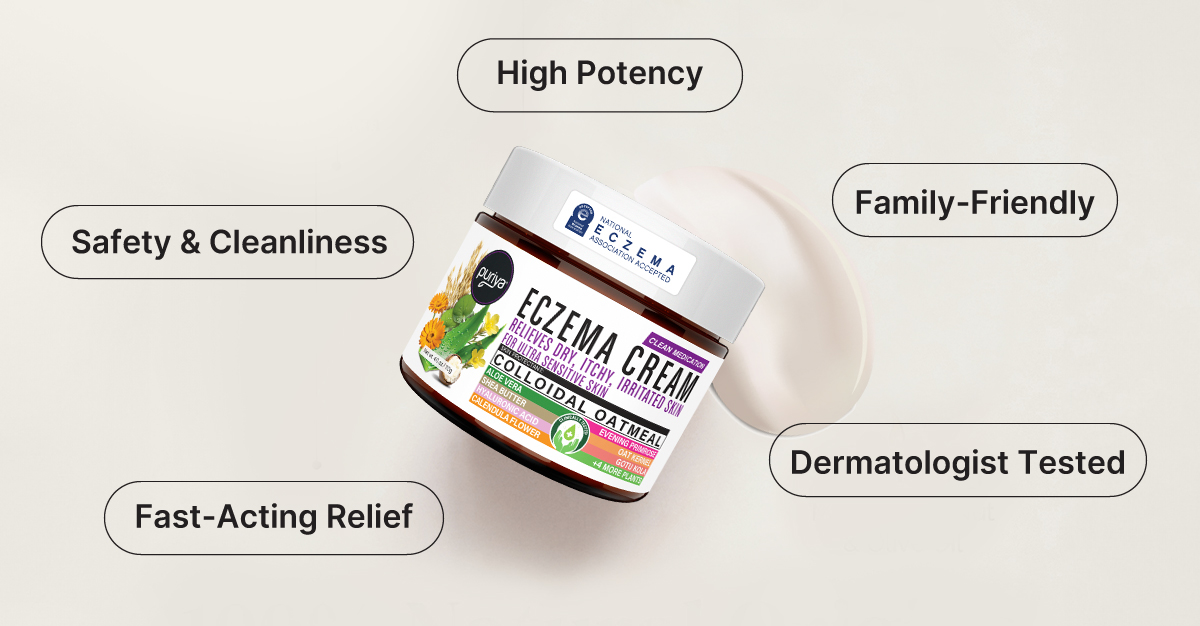

Decoding the Top Triggers for Eczema and How to Manage Them
Eczema can be a really annoying and persistent condition. It affectis millions of people worldwide with its non stop and frustrating symptoms. If you or a loved one have eczema, you know the constant fight to identify what causes flare-ups and how to avoid them. Identifying these sometimes hard to find triggers and incorporating a natural eczema cream into your skincare routine are vital steps to managing your skin’s health effectively.
Therefore, in this guide, we will attempt to explore the top triggers for eczema and provide you with some practical insights on managing them. From allergens to stress, let’s decode and unwrap what could be emaking your eczema symptoms worse and how to take actionable steps towards getting some needed relief from them.
Understanding Eczema
Eczema, aka atopic dermatitis, is a chronic skin condition characterized by inflamed, itchy, and dry skin. While the exact cause is still really not fully understood, a combination of genetic and environmental factors is often to blame. It’s critical to recognize that what may trigger eczema in one person can have zero effect in another. It can be really hard to pin down.

The Importance of Identifying Triggers
Pinpointing what triggers your eczema is key to managing it. By understanding what exacerbates your symptoms, you can take proactive measures to avoid or minimize exposure to these elements, hence leading to fewer flare-ups and better skin health.
COMMON TRIGGERS FOR ECZEMA

1. Environmental Allergens
Environmental allergens such as pollen, pet dander, and dust mites are common eczema triggers for many. These tiny particles can irritate your skin, causing flare-ups and irritation.
Managing Environmental Allergens:
Use hypoallergenic bedding to reduce dust mites.
Keep pets out of bedrooms to minimize exposure to pet dander.
Install air purifiers to filter out pollen and other airborne allergens.

2. Certain Foods
Food allergies or sensitivities can trigger or worsen eczema. Common culprits such as dairy, eggs, soy, and nuts can all contribute to eczema flare-ups.
Identifying Food Triggers:
Keep a food diary to track what you eat and how your skin reacts.
Consider an elimination diet to pinpoint specific food sensitivities.
Consult an allergist for professional testing and advice.

3. Stress
Stress is a another well-known trigger for eczema. Emotional stress can lead to physical symptoms, including eczema flare-ups.
Reducing Stress:
Practice mindfulness and meditation to manage stress levels.
Engage in regular physical activity to boost your mood and reduce anxiety.
Ensure adequate sleep to help your body cope with stress.

4. Climate and Weather
Extreme weather conditions, whether hot, cold, or humid, can aggravate eczema. Dry air can strip your skin of moisture, while humid conditions can lead to sweating and irritation.
Weather-Proofing Your Skin:
Use a humidifier indoors during winter months to maintain skin hydration.
Apply sunscreen to protect your skin from UV radiation.
Dress in breathable fabrics to reduce sweating and skin irritation.

5. Harsh Skincare Products
Skincare products containing alcohol, fragrances, and harsh chemicals can also irritate sensitive skin and trigger eczema.
Choosing the Right Skincare Products:
Opt for gentle, fragrance-free products like Puriya's natural eczema cream.
Patch test new products before applying them to larger areas.
Avoid products with alcohol or synthetic dyes.

6. Synthetic Fabrics
Clothing made from synthetic fabrics like polyester and nylon can irritate the skin and cause eczema flare-ups.
Wearing Skin-Friendly Fabrics:
Choose natural fabrics such as cotton, bamboo, or linen.
Wash new clothes before wearing them to remove any residual chemicals.
Use mild detergents that are free from dyes and fragrances.

7. Excessive Heat and Sweat
Excessive heat and sweat can aggravate eczema, leading to itchy and inflamed skin.
Staying Cool and Dry:
Wear loose, breathable clothing to reduce sweating.
Take cool showers after sweating to remove irritants from your skin.
Use fans or air conditioning to keep your environment cool.

8. Hormonal Changes
Hormonal fluctuations, such as those occurring during pregnancy or menstruation, can trigger eczema.
Managing Hormonal Triggers:
Maintain a consistent skincare routine to support your skin during hormonal changes.
Stay hydrated and eat a balanced diet to support overall skin health.
Consult with a healthcare provider for personalized advice during hormonal shifts.

9. Infections
Bacterial, viral, or fungal infections can worsen eczema symptoms by causing additional inflammation and irritation.
Preventing Infections:
Keep your skin clean and moisturized to prevent cracks and fissures.
Avoid scratching to reduce the risk of introducing bacteria to the skin.
Seek medical treatment if you suspect an infection.

10. Detergents and Cleaning Products
Harsh detergents and cleaning products can irritate the skin and trigger eczema flare-ups.
Using Gentle Cleaning Products:
Choose hypoallergenic detergents that are free from dyes and fragrances.
Wear gloves when cleaning to protect your skin from harsh chemicals.
Rinse clothes thoroughly to ensure no detergent residue remains.

11. Pollutants
Environmental pollutants like smoke and smog can exacerbate eczema by irritating the skin.
Minimizing Exposure to Pollutants:
Stay indoors on high pollution days to reduce exposure.
Use air purifiers to keep indoor air clean.
Avoid smoking and exposure to secondhand smoke.

Conclusion
Understanding the triggers for eczema is a crucial step in managing this chronic condition. By identifying and mitigating these triggers, you can achieve better control over your symptoms and improve your skin health. But for additional support, consider incorporating a natural eczema cream into your routine.
At Puriya, we believe in the power of gentle, natural ingredients to support your skin’s health. For this reason, our natural eczema cream is designed to be safe, effective, and gentle enough for everyday use. Additionally, with a formulation free from harsh chemicals, our cream helps maintain your skin’s barrier and reduce the risk of allergic reactions.
- Category:
- Allergies, Eczema, Natural Remedies
